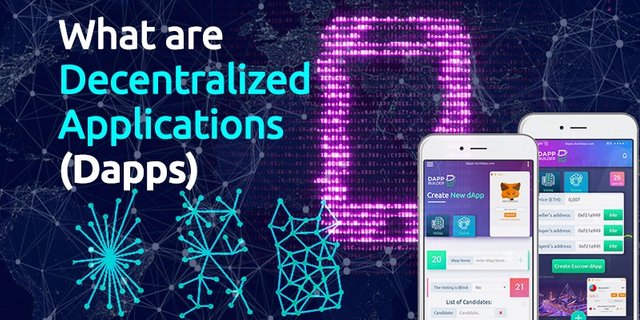
A question I get asked often is, "What are Dapps?", and I don't believe that will stop anytime soon.
Let me tell you why.
Dapps, or decentralized applications, are a hallmark of the future blockchain developers are aiming to bring to the world. Dapps promise to bring about a true implementation of the Internet of Value, or as some call it, Web 3.0.
We imagine applications with no owner that can operate as independently as the internet itself. Afterall, the internet was originally envisioned to support value transfer, but as we have learned through decades of torrents and server hacks, valuable data can simply be copied and distributed at will.
Not to mention the surveillance and privacy issues surrounding the transfer of assets, money, and property online.
This left us with the massive centralized infrastructure we have today built by companies like Google, Amazon, Microsoft, and Equifax, etc who we trust to keep our valuable data safe from wrongful activity at the expense of not owning it ourselves.
This is similar to how we trust banks to manage our hard earned money, and it's a good system. It works.
I don't worry about my bank balance going to zero overnight, because even if somehow my account was compromised, I have banking instruments in place to return my funds to me.
That said, it isn't perfect. Our data in this day in age is who we are. As a former advertiser i'm all too familiar with the current monetary model online. User data is money. We pay for it, we build systems to make decisions based on it, and we get manipulated by those systems each day to complete desired actions online.
So where do Dapps come into play? What are decentralized applications and how are they going to help us resolve these types of problems?
Quick Overview

Credit - Redactor on Medium
Dapps are basically just open-source applications built and deployed on decentralized blockchains which use distributed consensus methods to facilitate the proper execution of functions over time.
I know what you are thinking, this sounds lot like Bitcoin, Ethereum, and many other blockchain systems currently out there right?
Well yeah, because they are in fact Dapps. So what isn’t a Dapp?
- Any executable software that is owned exclusively by a centralized authority, (I'm looking at you Ripple)
- Any executable software that isn’t utilizing a blockchain (or similar decentralized ledger technology) to operate.
- Any executable software that allows the past data to be changed, or working data to be appended without distributed consensus.
You probably get the point. Dapps run themselves and don’t rely on a single authority to work once deployed. An easy comparison to a Dapp is a torrent, such as Pirate Bay, which is run by peers in a network to transfer valuable items online from software to music.
Torrents never evolved however, due to their ethical issues and clear violation of owner's rights. Your valuable data isn't secure in traditional peer-to-peer networks, which brought us to Bitcoin.
Under this context, Bitcoin is essentially the first Dapp, since it can securely manage the transfer of value without inflicting an offense on another party. Simply put, nobody could manipulate the Dapp to do what they want and get away with it.
This became the first real iteration of an internet of value. For the first time in history, anybody could download the Bitcoin Dapp, and exchange value across all borders without a central authority required to ensure the transaction was honored and maintained integrity over time.
Compare this to me selling you a pirated movie and continually replicating and reselling that movie as many times as I like to as many people as I like.
Dapp Implementation

Since Dapps can transfer value securely, transparently, and without fraud, we can start to imagine what services could benefit from combining the speed of the internet with a transfer of value. Two quick examples include:
- Property Ownership: Titles, deeds, digital art, in-game items.
- Identification: Licenses, credentials, credit, and records issuance.
That's just a couple real world uses aside from just sending money from one place to another. The next question always is, "Why would any of these services need to be replaced with a Dapp?"
There are four main reasons you would Dappify a current process:
- Eliminate the possibility of duplicate value transfers
- Ensure the integrity of a value transfer
- Distribute application use to as many people as possible
- Eliminate possibilities of censorship, downtime, and fraud
If you are still wondering what the whole point of these Dapps are, I want you to think about a few questions:
- How many times have you had to make a new medical record at a new healthcare provider?
*How many times have you wondered if those eggs you bought really were free range? - What will happen to your data if a government or company shuts down you favorite online accounts locking you from all your data?

Dapps give us the ability the securely make universal records, verify supply chains, and provide ownership of our data and applications as a global community without the need for a company, government, or any other person to make it happen.
If you'd like to learn more about Dapps and other blockchain topics, you can either head over to our blockchain community over at Accrubit, or just drop a comment below!